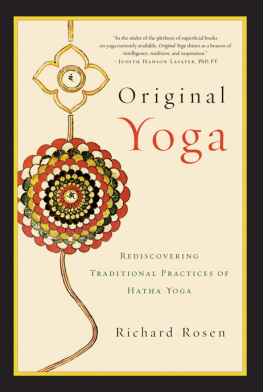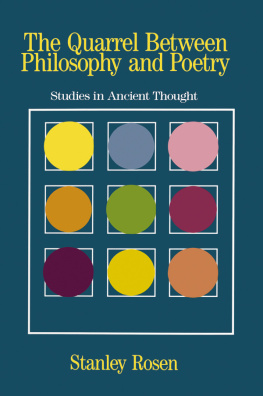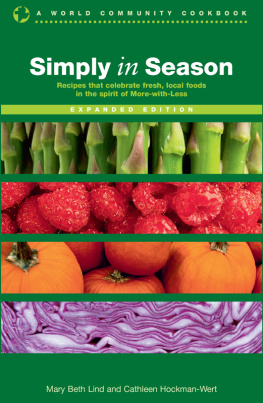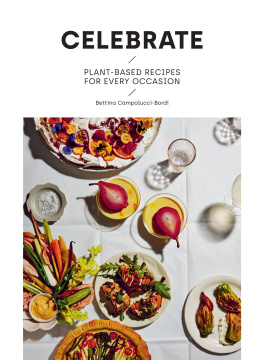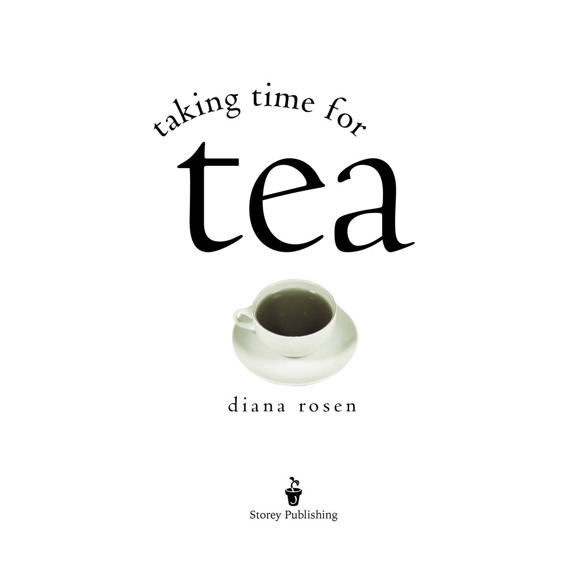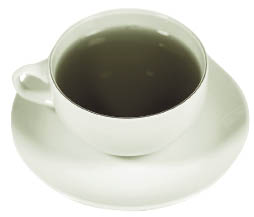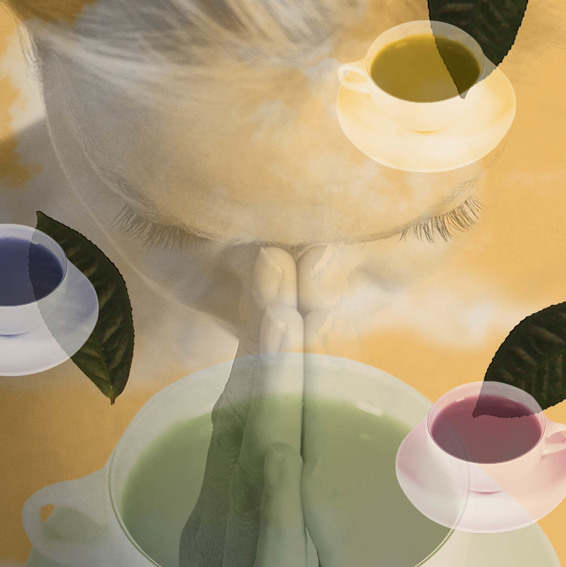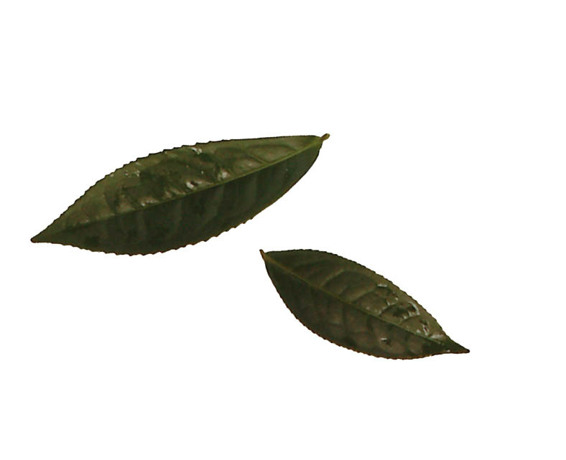Acknowledgments
Thank you to the entire staff of Storey Publishing; you make the writer-publisher experience a pleasure.
Contents
Introduction
Taking a bowl of green tea in your hands and drinking it, you feel one with nature, and there is peace. This peace can be spread by offering a bowl of tea to another. I hope you will drink and share this peace with me.
Soshitsu Sen XV, Tea Life, Tea Mind
What Tea Means to Me
As the venerable fifth-generation Japanese tea master writes so elegantly, tea is a metaphor for peace. Drinking tea alone is a form of meditation, a way of releasing the cares of the day, allowing a sense of accomplishments and satisfactions to embrace us.
Drinking tea is also a form of community, with one person or many, in which common interests or goals are exchanged and the foundation of friendship is strengthened. Serving tea to strangers, to new business associates, or to government officials is a way to soften, to appease, to make calm, so that all can meet, work, and rule in some comfort and style.
Taking the time to prepare tea for others is an important bridge of communication, and carefully preparing tea for ourselves is a vital link to our deepest core.
This, then, is what tea means to me: the embrace of friendship, quiet contemplation, and the sustenance that can bring inner serenity and peace.
For more than 25 years, I have been a willing student of all the pleasures of tea. If I had only encountered my childhood black tea served in a glass, drunk over a sugar cube melting on my tongue, I would have been happy. If I had only encountered a blend of the worlds best blacks silkened with milk, served with a buttery scone, I would have been delighted. If I had only sipped the exquisitely fragrant oolong served gung fustyle in a tiny Taiwanese clay teapot and poured into tinier cups, I would have visited nirvana. If I had only had the many taste adventures of green teas, recalled the memory of powdered tea whisked to a frothy nectar and served in a serene Japanese tearoom, that would have been enough.
But tea has given me so much more, and it continues to do so. Tea invites me to employ all my senses. The gently bubbling sound of the water kettle; the tactile pleasures of a fine porcelain vessel in which to brew the tea; the visual delight of the ballet of unfurling leaves; the fragrance, the taste all are parts of the wonder of tea.
When we give tea the time and care it deserves, it returns to us all its infinite gifts. Each cup is a rapturous prayer no words can describe.
I am alone with the beating of my heart...
Lui Chi (first emperor of the Han dynasty)
Creating a Spiritual Place for Reflections on Tea
Everyone should have a small corner in which to relax, be quiet, reflect. It could be a hobby room with all your treasured tools and projects around you. Or a flower- and wicker-furnished atrium that overlooks a garden, or a book-lined, wood-paneled room with a roaring fire all year long to accompany your thoughts.
Perhaps you find serenity lounging in your bath with tea in a gauze bag to smooth over your wet skin, or in your boudoir with a tea-scented candle or incense emitting its sweetness, some spent tea bags placed over your eyes to rest them and reduce fatigue.
Your small corner could be a barely furnished room with a singular piece of beauty: a painting, a photograph, a sculpture that cries for the touch. Serenity for you might be gazing out the kitchen window at the birds, or being outdoors by a campfire, biking in a park, or just sitting a spell on the front-porch glider.
Spending Time with You
Give yourself 10 minutes a day to visit your special space, enjoy tea and quiet, and regenerate yourself. Even in the oddest places you can savor your tea and ten: waiting at the airport, on the airplane itself, in a hotel room. At work, you can choose a restorative cup of tea drunk in silence in the employee lounge, on the rooftop or in an outdoor area, in the boardroom, or even at your desk. (If you do it at the same time every day, coworkers will get the hint and leave you to your tea experience. Maybe theyll even do it themselves.)
Make an appointment with yourself to meditate in the manner that feels most comfortable to you. You bathe, brush your teeth, and eat why not include meditation with a cup of tea as one of those everyday things that are essential to your health and well-being?
Meditation with a cup of tea is time to suspend thought, ease your mind and body, and rest your soul. Giving yourself 10 minutes a day with a cup of tea will go a long way toward improving your health, your happiness, and thus your life. Meditation need not be formal, religious, or intent on solving the worlds or your problems; it is just a Sabbath from the everyday.
Make a date with yourself right now. Choose your special corner, and give yourself just 10 minutes to savor some tea and rest your mind. Who deserves this more than you?
The path to heaven passes through a teapot.
Ancient proverb
Celebrating the Particular with Tea
Tea-making is a theme used in hundreds of artworks throughout the Orient and the Western world. Whether its a romantic couple by a samovar, an elegant king presiding over his royal court, or a solitary person with her teacup, tea is a vital subject for art and life.
I am in no way interested in immortality, only in the taste of tea.
Lu Tung, eighth-century Chinese poet
Passages and Accomplishments
The protocol in the 19th century was that a persons name should appear but three times in the local paper: at birth, marriage, and death. This is not to say that special occasions and events were not celebrated, only that most were supposed to be private. Such limited acknowledgments are not for me. I believe every accomplishment, any exceptional endeavor, all joy, and some sorrows, should be shared with friends and family over a pot of tea whenever possible.
For children, it is especially important to acknowledge all the little everyday accomplishments that go toward developing a well-rounded, productive young adult. Something as simple as a special breakfast tea can send a child off with a fortitude deeper than can the nourishment of food. Whether its learning to tie a knot, mastering multiplication tables, riding a bike, or writing that first term paper, a modest celebration of these accomplishments demonstrates your love and appreciation for this growing, evolving being: your child.
For adults, it is critical to continue these mini-celebrations, especially when we are involved in dangerous or highly competitive careers, where praise and applause are meted out sparingly, if at all. When coworkers or employees go the extra mile, sustain production above the call, do the job with spirit and enthusiasm, its time to acknowledge, celebrate, and honor their achievements with verbal praise, written kudos, or a cordial tea break that recognizes that these are people, not just statistics.






